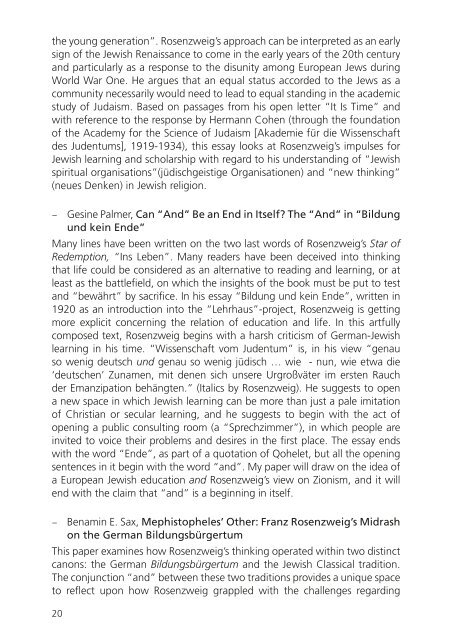Franz Rosenzweig
VZ2hG1
VZ2hG1
Create successful ePaper yourself
Turn your PDF publications into a flip-book with our unique Google optimized e-Paper software.
the young generation”. <strong>Rosenzweig</strong>’s approach can be interpreted as an early<br />
sign of the Jewish Renaissance to come in the early years of the 20th century<br />
and particularly as a response to the disunity among European Jews during<br />
World War One. He argues that an equal status accorded to the Jews as a<br />
community necessarily would need to lead to equal standing in the academic<br />
study of Judaism. Based on passages from his open letter “It Is Time” and<br />
with reference to the response by Hermann Cohen (through the foundation<br />
of the Academy for the Science of Judaism [Akademie für die Wissenschaft<br />
des Judentums], 1919-1934), this essay looks at <strong>Rosenzweig</strong>’s impulses for<br />
Jewish learning and scholarship with regard to his understanding of “Jewish<br />
spiritual organisations”(jüdischgeistige Organisationen) and “new thinking”<br />
(neues Denken) in Jewish religion.<br />
– Gesine Palmer, Can “And” Be an End in Itself? The “And” in “Bildung<br />
und kein Ende”<br />
Many lines have been written on the two last words of <strong>Rosenzweig</strong>’s Star of<br />
Redemption, “Ins Leben”. Many readers have been deceived into thinking<br />
that life could be considered as an alternative to reading and learning, or at<br />
least as the battlefield, on which the insights of the book must be put to test<br />
and “bewährt” by sacrifice. In his essay “Bildung und kein Ende”, written in<br />
1920 as an introduction into the “Lehrhaus”-project, <strong>Rosenzweig</strong> is getting<br />
more explicit concerning the relation of education and life. In this artfully<br />
composed text, <strong>Rosenzweig</strong> begins with a harsh criticism of German-Jewish<br />
learning in his time. “Wissenschaft vom Judentum” is, in his view “genau<br />
so wenig deutsch und genau so wenig jüdisch … wie - nun, wie etwa die<br />
‘deutschen’ Zunamen, mit denen sich unsere Urgroßväter im ersten Rauch<br />
der Emanzipation behängten.” (Italics by <strong>Rosenzweig</strong>). He suggests to open<br />
a new space in which Jewish learning can be more than just a pale imitation<br />
of Christian or secular learning, and he suggests to begin with the act of<br />
opening a public consulting room (a “Sprechzimmer”), in which people are<br />
invited to voice their problems and desires in the first place. The essay ends<br />
with the word “Ende”, as part of a quotation of Qohelet, but all the opening<br />
sentences in it begin with the word “and”. My paper will draw on the idea of<br />
a European Jewish education and <strong>Rosenzweig</strong>’s view on Zionism, and it will<br />
end with the claim that “and” is a beginning in itself.<br />
– Benamin E. Sax, Mephistopheles’ Other: <strong>Franz</strong> <strong>Rosenzweig</strong>’s Midrash<br />
on the German Bildungsbürgertum<br />
This paper examines how <strong>Rosenzweig</strong>’s thinking operated within two distinct<br />
canons: the German Bildungsbürgertum and the Jewish Classical tradition.<br />
The conjunction “and” between these two traditions provides a unique space<br />
to reflect upon how <strong>Rosenzweig</strong> grappled with the challenges regarding<br />
20


